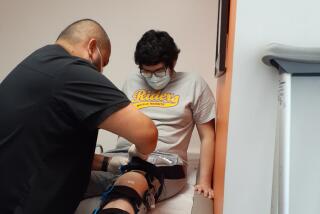Exercise Caution if You Hire a Personal Trainer
- Share via
RICHMOND, Va. — Personal trainers aren’t just for rock stars anymore.
Once reserved for the rich and famous, these typically trim and tough “fitness specialists” are everywhere. They can be found in community gyms and health clinics in the smallest corners of the country, guaranteeing that no matter what look you’re hoping for, you no longer have to struggle to get it alone.
But beware, experts say. There is no professional requirement to be a trainer. The fitness industry is so unregulated, the person spotting your sit-ups could be anything from a rehab specialist to a dressed-up jock.
“It’s too easy to become a trainer,” said Greg Werner, director of strength and conditioning at James Madison University in Harrisonburg. You’ve got people coming out of the woodwork who say they want to do this.”
The danger, Werner said, is that gyms will boast about a staff that might not be as experienced as advertised.
“There’s a ton of certifications out there,” said Richard Cotton, chief exercise physiologist for the California-based First Fitness Inc. “[A certification] is a badge that someone can wear for good reasons and not-so-good reasons.”
Certifications make exercise trainers seem more professional, Cotton said, but they vary widely in quality. For example, an American College of Sports Medicine certification--considered the gold standard of fitness certifications--requires six months of study, workshops and tests. But most others require less, said Cathy Stewart, director of certification for the college.
There are about 250 organizations that grant some sort of professional certification to fitness specialists, said Jennifer Evans, a spokesman for the American Council on Exercise. The council, one of the larger organizations, has certified 88,000 fitness specialists since 1990. In 1999 alone, the council passed 7,535 trainers--six times more than it did in 1990.
Exercise trainers are becoming so numerous and specialized that many are filling in gaps in the health care system, Cotton said. For example, people recovering from heart disease increasingly discover that their insurance won’t cover outpatient therapy, and many of those turn to personal trainers, he said. Although they’re not trained enough to replace experienced therapists, Cotton said, exercise trainers with specialized certifications can help those who are finishing their rehab programs at a cheaper price.
“Business is booming,” said Edwin Stumpf, a trainer at Chippenham Medical Center in Richmond, who has a specialized certification in exercise physiology. “We don’t have enough space to accommodate the people coming in.”
Patients will work out at his clinic for years after suffering heart injury, Stumpf said. They like working out under the supervision of trained staff, Stumpf said.
“It gives them more confidence.”
Personal fitness trainers can be a good solution for those searching for a new workout or those who need help staying motivated, said Carrie Headd, a fitness specialist in Richmond.
If you’re thinking of getting a trainer, the most important thing is to make sure you get along with the person you choose to work with, she said. And don’t expect them to get you in shape right away, said Headd, who likens her job to that of a piano teacher.
“We can watch you for a day or two, but the rest of the time you’re on your own.”


